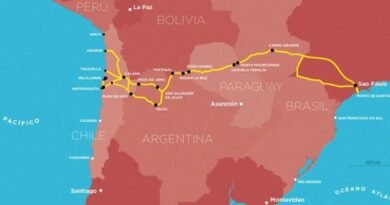Argentina offers to help Uruguay through the water crisis
[ad_1]
Argentina offers to help Uruguay through the water crisis
Lacalle thanked the offer but declined it for now
Argentine President Alberto Fernández offered his Uruguayan colleague Luis Lacalle Pou a mobile water treatment plant, supplies, and personnel to assist in the drinking water crisis affecting Montevideo and the Metropolitan area.
During a phone call late Thursday, Lacalle thanked the initiative but chose to decline it for the time being, it was reported Friday in Buenos Aires. Lacalle explained that the situation was dynamic and argued that it had rained recently in Montevideo.
Through a letter sent to the Uruguayan Foreign Ministry, the Argentine president offered a mobile water treatment plant with a production of 1,700 half-liter sachets per hour, as well as the displacement of operating personnel to develop the production, in addition to a Navy sloop with a tank containing 300 tons of water, to respond to the vulnerable populations affected by the water crisis, centered in the city of Montevideo and the Metropolitan area, the Palacio San Martín said in a statement.
The Uruguayan Consulate in Buenos Aires replied that the offer was thanked and that due to the dynamics of the situation under permanent evaluation, the moment to accept it would be announced in due time.
The Uruguayan government insisted that the water supplied by the state-owned company OSE remains fit for human consumption. The quality of the water will not be modified under the current conditions, Presidential Secretary Álvaro Delgado said.
The quality of the water is still fit for human consumption and for other essential situations of its use will continue in this situation, he added.
Lacalle headed a coordination meeting on the water crisis with Ministers Francisco Bustillo (Foreign Affairs); Karina Rando (Public Health); Robert Bouvier (Environment); Javier García (Defense), and Martín Lema (Social Development) to evaluate the situation in the San José river reservoir work, an alternative that is being handled as a support to the Paso Severino reservoir.
The situation of yesterday’s rain and other decisions that were taken allow us to ensure this level of water quality, said Delgado.
Between Tuesday and Thursday, rainfall doubled that of the whole of June in Uruguay.
OSE (Obras Sanitarias del Estado) President Raúl Montero said that after two nights of favorable rains, the emergency due to the imminent exhaustion of the reserves had changed. He also stressed that the capacity of the Aguas Corrientes water treatment plant is at its limit and that for this reason new plants are needed, such as the one in Arazatí, in the town of San José, which will take water from the Río de la Plata.
OSE is living, I believe, in recent history, one of the worst moments. The situation, which affects more than half of the country’s population, is very hard. And I believe that, in spite of all the difficulties, the fact that this is happening almost exempts me from the importance of the project that brings us here, Montero pointed out.
In the month we would need it to rain between 80 and 90 millimeters, which is the meteorological statistics or the normal that should rain at this time of the year, also taking into account that the winter season is when it rains the least, contrary to what is thought. But if we were to reach that accumulated value of 80 or 90 millimeters in the whole month, those would be normal values for the time of the year, explained Natali Bentancor, director of Meteorological Services at the weather bureau Inumet.
Meanwhile, Deputy Tourism Minister Remo Monzeglio insisted that for the moment there is drinkable water everywhere and underlined that, in places such as Colonia and Maldonado, there is absolutely no problem whatsoever.
[ad_2]
Source link




